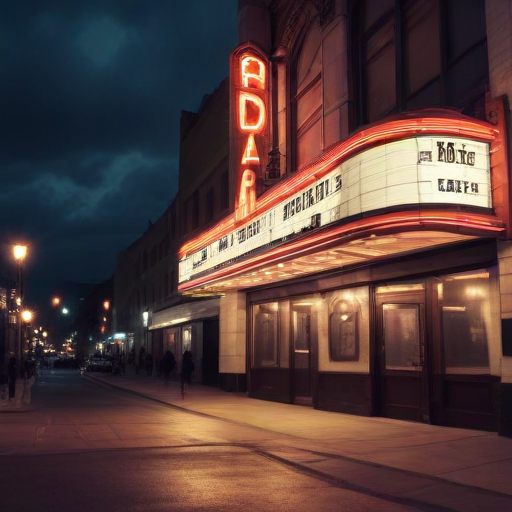A unique cultural event unfolded at the Apollo Theatre on October 22, as the 1922 silent film Nosferatu was screened with the haunting soundscape of Radiohead’s albums Amnesiac and Kid A. This special screening was part of the Silent Synced project, initiated by an independent theater owner in Austin, Texas, aiming to pair classic films with contemporary alternative rock music. The event, dubbed “Nosferadioheadtu” by the Apollo’s marquee, marked the first of many planned screenings across the country.
Typically known for screening blockbuster films, the Apollo Theatre—owned by Oberlin College—sought to add a distinct experimental flair to its programming. Michael Deane, the general manager, stated that while the theater often thrives on children’s movies, they also seek sustainability by diversifying their offerings.
The turnout for this one-night-only event was remarkable, with long lines forming ahead of the screening and over half of the theater’s capacity filled with eager attendees, including both students and local residents. Ruby Spencer, a third-year college student, noted the impressive turnout, expressing excitement at the community’s enthusiasm.
Deane cited the overwhelming interest from the audience, stating that their attendance was markedly higher than usual. He emphasized the theater’s commitment to creating unique experiences, exemplified by the raffle held before the screening, where guests had the chance to win memorabilia related to the film.
This screening was part of the Apollo’s broader aim to resonate with the cultural tastes of its community. Deane’s personal affinity for Radiohead inspired the feature choice, as he reminisced about waiting in line for the album Kid A upon its release. Previous events, such as a Halloween promotion featuring characters from the film, demonstrated the theater’s innovative approach to engaging its audience.
While some attendees, like second-year student Cass Campi, expressed challenges in staying engaged with the film itself, the overall consensus highlighted the event as a uniquely enriching experience that transcended simply watching a movie. Campi noted that the atmosphere crafted by the Apollo made the evening special—a rare opportunity to experience a classic film in a distinct and communal setting.
Both Spencer and Campi expressed hope that the Apollo Theatre would continue to host more one-night-only screenings, reflecting the desires and interests of the Oberlin community. Deane, drawing inspiration from his own formative experiences at local theaters in college, shared his aspiration to enrich the cultural fabric of Oberlin for current and future students.
In summary, this creative marriage of classic cinema and modern music not only captured the essence of Oberlin’s eclectic artistic spirit but also signaled a promising shift towards more diverse and community-oriented programming at the Apollo Theatre. Such initiatives can significantly enhance cultural engagement and appreciation in the local area, foster community spirit, and encourage the exploration of unconventional artistic expressions.
